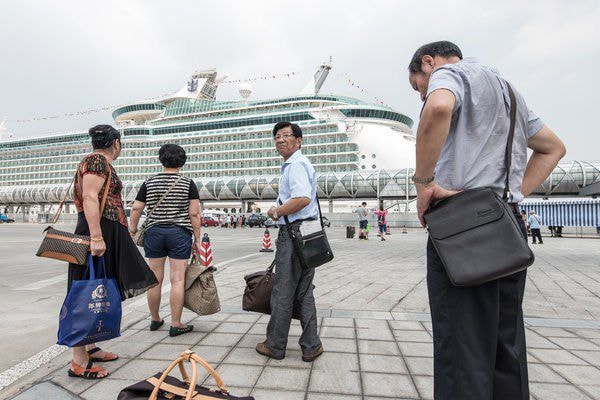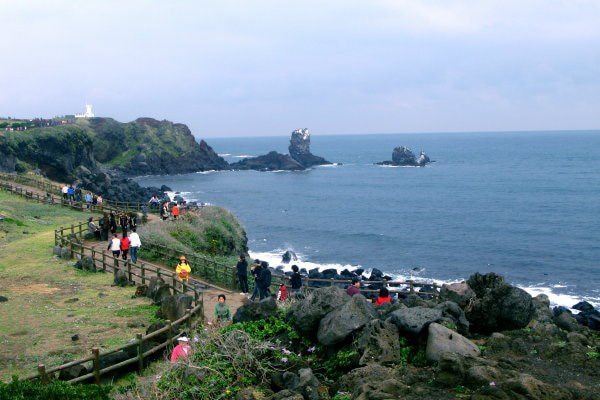Koreans upset by Chinese "invasion"
On Jeju Island, those who sell land to Chinese people are called "traitors to the country". Many hotels even have signs outside to announce that they have nothing to do with China.
Not far from Shin Yong-kyun's strawberry farm on Jeju Island, South Korea, are the ruins of an airfield built by Japanese colonialists in the 1930s to launch air raids against China, and coastal caves that the Japanese carved out to hide their warships.
Japan's imperial era is long over, but Mr. Shin and many residents of this idyllic resort island still worry about what some call a new "invasion" as a growing wave of Chinese tourists and investors flock to Jeju.
“The Chinese come here, one after another. They buy land everywhere. I am afraid this island will be turned into a Chinese colony,” said Mr. Shin.
“This is an island with a lot of pain. The sudden appearance of so many Chinese is adding to that pain,” he added.
 |
| Chinese tourists are traveling from Shanghai to Jeju Island. |
China’s aggressive push to control nearby waters has also worried many South Koreans. Some fear that China will become such an important economic partner that it will influence South Korean policies. Many especially fear that Beijing will drive a wedge between Seoul and Washington, their most important national security partner.
“Jeju is the first point of contact between South Korea and China. What we are doing is a test of how South Korea shapes its relations and policies toward China,” said Kim Nam-jin, a Jeju provincial government official in charge of cooperation with China.
Before it became a tourist destination, Jeju was still an island largely based on agriculture and fishing. So many men left to find work that the island was famous for its overwhelming female population.
As the Korean economy boomed, Jeju became a favorite destination not only for honeymooners but also for Korean students.
 |
| Jeju is a beautiful island in Korea. |
Jeju then became especially welcoming to the Chinese, as many officials thought this could turn the island into an international destination.
Chinese tourist Lisa Xue, 60, said she and many of her guests liked the island because it was so close to China, just a two-hour flight from Beijing. Meanwhile, wealthy Chinese saw it as a good place to speculate on real estate.
However, last year, local media and critics began accusing Chinese real estate developers of “invading” South Korean land. They also said that most Chinese tourists not only disregard and violate some of South Korea’s social customs, but also often stay, eat, and shop only in Chinese-owned hotels, restaurants, and shopping malls.
Furthermore, as property prices rise, Koreans fear that life in Jeju will become more expensive. These fears are so strong that those who sell land to Chinese are being compared to “traitors to the country.” One hotel even had to put up signs outside to dispel rumors that it was controlled by Chinese.
Chinese businessmen have built and announced many hotel projects and high-rise apartment buildings. Locals are concerned that these apartment buildings will be inhabited mainly by Chinese people.
In a 2014 survey of 1,000 islanders, 68% said the growing number of Chinese tourists did not contribute to Jeju Island's development.
Kim Hong-gu, a Jeju businessman, complained about Chinese people arguing and smoking on the streets.
Mr. Kim accused China of using its money to turn Jeju into a “Chinatown.”
Hong Young-cheol, head of the Jeju Solidarity for Environmental Conservation organization, suspects that Chinese tourists ignore Korean customs because they look down on Korea as a small country.
Others, however, argue that China should not be shunned for economic reasons. The influx of Chinese money is seen by many as a lucrative economic opportunity. They hope that new apartments and hotels will boost Jeju Island's reputation.
China is now South Korea’s largest trading partner. South Korean President Park Geun-hye is seeking to strengthen ties with China, having met several times with Chinese President Xi Jinping. Even some in Jeju, who welcome Chinese investment, worry that the naval base under construction will be used by the US Navy and drive out Chinese investors.
The influx of Chinese people and money into Jeju is partly due to government policies on the island, including allowing foreigners to visit without a visa and granting permanent residency to those who own homes there. Foreigners also enjoy the same health and employment benefits as South Koreans without having to give up their citizenship, according to the NYT.
Of the 6.1 million Chinese tourists who visited South Korea last year, nearly half of them visited Jeju, a five-fold increase from 2011.
Although Chinese-owned land in Jeju accounts for less than 1 percent, it is growing at a rapid pace, from 5 acres in 2009 to 2,050 acres in 2014. More than 70 percent of the $6.1 billion in foreign investment in Jeju Island between 2010 and 2014 came from China.
According to Infonet/The New York Times
| RELATED NEWS |
|---|






